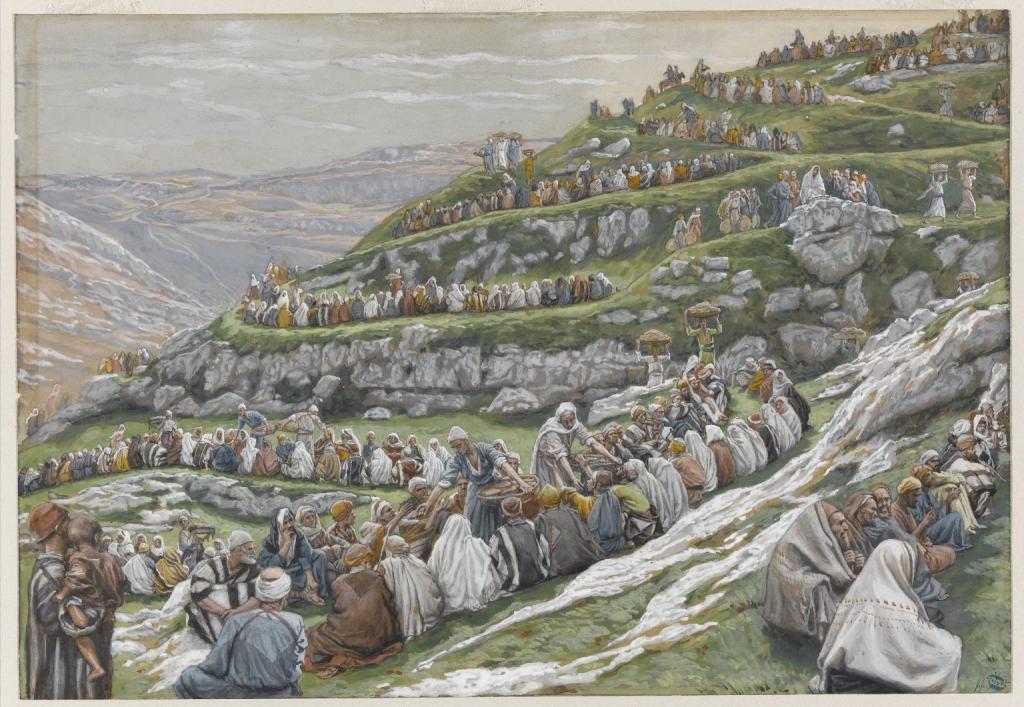
A reading from the Holy Gospel according to John:
Jesus went across the Sea of Galilee.
A large crowd followed him,
because they saw the signs he was performing on the sick.
Jesus went up on the mountain,
and there he sat down with his disciples.
The Jewish feast of Passover was near.
When Jesus raised his eyes
and saw that a large crowd was coming to him,
he said to Philip,
“Where can we buy enough food for them to eat?”
He said this to test him,
because he himself knew what he was going to do.
Philip answered him,
“Two hundred days’ wages worth of food would not be enough
for each of them to have a little.”
One of his disciples,
Andrew, the brother of Simon Peter, said to him,
“There is a boy here who has five barley loaves and two fish;
but what good are these for so many?”
Jesus said, “Have the people recline.”
Now there was a great deal of grass in that place.
So the men reclined, about five thousand in number.
Then Jesus took the loaves, gave thanks,
and distributed them to those who were reclining,
and also as much of the fish as they wanted.
When they had had their fill, he said to his disciples,
“Gather the fragments left over,
so that nothing will be wasted.”
So they collected them,
and filled twelve wicker baskets with fragments
from the five barley loaves
that had been more than they could eat.
When the people saw the sign he had done, they said,
“This is truly the Prophet, the one who is to come into the world.”
Since Jesus knew that they were going to come and carry him off
to make him king,
he withdrew again to the mountain alone.
Jesus went off across the Sea of Galilee, and a whole crowd followed Him, because they had seen what He did for the sick. They wanted to see if Jesus could do something for them. They wanted to see another wondrous sign, and maybe get the miracle. Everyone needs a miracle of one kind or another, except God. The rest of us are short on miracles most of the time, but God needs nothing.
A multitude of people dropped what they were doing and ran to where He was, most of them without common sense, without planning ahead, without so much as packing a lunch. Why pack a lunch when you’re going to get a miracle? A miracle will take care of everything.
Jesus lifted His eyes and saw the throng streaming toward Him, five thousand men who wanted to see a miracle. Nobody bothered to count the women and children, as usual, but the men were five thousand, give or take.
Jesus knew their exact number. He knew why they’d come. He clearly saw in each soul the miracle for which they were desperate. He felt for them. He Himself was God Who needs nothing, but also a Man, like them in all things but sin. And like them, it seems, He’d forgotten to pack a lunch.
Jesus asked Philip, “where can we buy enough food for them to eat?” as if such a place existed.
All Philip could think about was money, and the fact that there wasn’t enough.
And then Jesus did a strange thing.
Jesus was God Who needs nothing. He didn’t need somebody else’s food to work a miracle. He could create a feast out of nothing at all, the same way His Father had created light without the sun or moon or stars. But He didn’t choose to do that. He chose to do nothing, and wait until somebody else offered a solution.
Simon Peter put his oar in. “There is a boy here who has five barley loaves and two fish; but what good are these for so many?”
Oh, Simon Peter, that’s everything. That’s exactly what God was waiting for. He was waiting for someone who had remembered lunch to give up his lunch. For someone who had planned ahead to offer to help the ones who hadn’t. For a person who needed nothing to give up what he had, becoming vulnerable and needy, so that somebody else’s suffering could be healed. That was what Jesus Himself had done, after all. That is what the incarnation is: God Who needs nothing becoming man who needs everything, so that Man might be reconciled with the Father.
The boy did just that. It wasn’t one of the five thousand men who did this, not one of the people who counted. It was a child, somebody who counted for nothing. He had brought a little more lunch than one boy really needs: five loaves of barley and two small fish. He gave the whole thing over to Jesus, Who didn’t have a lunch. He performed a work of mercy for the God Who needs nothing.
And Jesus used that work of mercy to perform a miracle.
All the people reclined on the grass– the five thousand men who counted for something, and everyone else as well. The boy who had done what Christ had done was there somewhere. Jesus broke the loaves, gave thanks, and passed them out. He passed out the two little fish. And everyone lying there found themselves eating bread and fish– all of them, the ones who counted and the ones who did not, the little boy and the twelve apostles and presumably Jesus Himself.
After they’d finished their feast, Jesus sent the apostles to gather the broken fragments, twelve wicker baskets full. That was enough to get them started. They had been given food freely; the food to town and give it away to whoever was still there, all the people who had stayed home and missed the miracle. And maybe everyone in town could learn from this moment what God expected them to do. He wanted them to turn to one another in mercy. He wanted them to give freely of what they had been freely given, and to trust that where they saw only problems, God would work a miracle through their having mercy on one another. That would be a miracle, a glorious and beautiful miracle, the healing of something that had been broken for as long as anyone could remember. Humankind could be reconciled to one another. We wouldn’t have to fight over resources anymore. We could turn to each other in mercy instead.
The people turned to each other and said, “This is truly the prophet, the one who is to come into the world.”
And then they turned on Jesus to try and make Him king by force.
They didn’t understand the miracle they’d witnessed. They didn’t notice that Jesus had asked for help, and stood there doing nothing. They didn’t remember the boy whose work of mercy had begun the whole miracle. All they knew was that that man had made one lunch into five thousand, not counting the lunch for the people who didn’t count. They mobbed Him and tried to set them up as their King.
Jesus was already a King, but His Kingdom was not of this world. He didn’t need to be a King. He needed nothing. He wanted nothing except to have mercy, to give up what He had so that someone’s suffering could be healed.
So He withdrew once again to the mountain alone.
I don’t know what happened to those five thousand men. I suppose they went back to whatever they’d been doing before.
I don’t know what happened to all of that leftover bread. For all I know they left it by the Sea of Galilee.
Maybe the bread is still here among us, somehow.
Maybe we all have something– something too small to do any good, something we can give away to Jesus in mercy, so that He can work a miracle for a multitude of people.
Maybe it’s not too late to get it right.
Image via Wikimedia Commons
Mary Pezzulo is the author of Meditations on the Way of the Cross and Stumbling into Grace: How We Meet God in Tiny Works of Mercy.
Steel Magnificat operates almost entirely on tips. To tip the author, visit our donate page.













